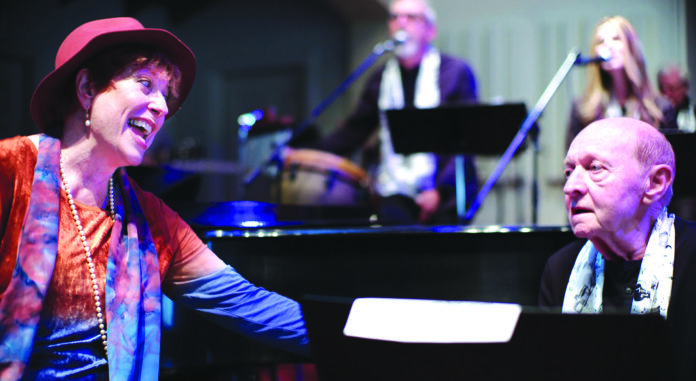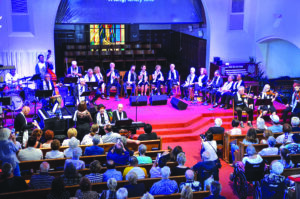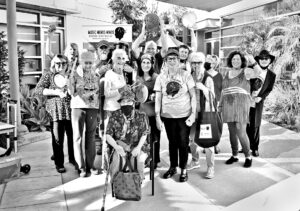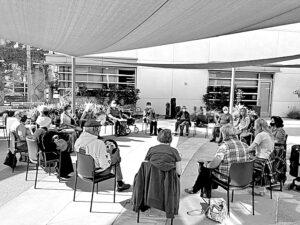
When Carol Rosenstein’s husband Irwin was diagnosed with Parkinson’s disease, later coupled with dementia, life for both of them would never be the same again. When Irwin’s medication started to have the side effect of terrifying hallucinations their neurologist, Dr.Jeff Bronstein at UCLA, lowered the dose of dopamine and that had the unfortunate effect of, in Carol’s words, “pulling the rug out from under Irwin’s feet.”
“I would have to allay his fears that we indeed were the only two in the house and he was having medication side effect issues,” Carol told the CCN. “I called our wonderful personal neurologist, Dr. Jeff Bronstein, and said that this is what’s going on. As we bring the dose of dopamine down, which is the neural transmitter that keeps Parkinson’s patients going, my poor guy had the rug pulled out from under his feet. But I would watch him playing the piano in our home, quietly in a low state, and after about ten or fifteen minutes he would resurrect and engage in his environment like a flower that needed water.”
Dr. Bronstein confirmed that this wasn’t a fluke – that music has the power to change brain chemistry. That gave Carol the idea that would eventually become Music Mends Minds.
“Fast-forward a couple of months, I had a launch of 30 people and of the 30 people, none of whom I knew, four souls gathered around a Steinway piano – one on the piano and one at the drum kit next to it,” she said. “Irwin grabbed a saxophone, and a fourth pulled out a harmonica from his pocket. They started playing music together and in 15 minutes, they were joined at the hip and became the Fifth Dementia Band. PBS heard about us, and came in with their crew and said they wanted our story. It went out nationally over the 7 O’Clock News, and 150 calls came in from people wanting to find out where they could find the music. Of course, we were in our infancy so we had to put them on hold but since then, Music Mends Minds and the Fifth Dementia Band continued to grow to global acclaim.”
Carol is the founder and executive director of Music Mends Minds, an organization that has gone from strength to strength since those early days, improving countless lives.
“Pre-COVID, we had 20 bands around the country than the world and one band in Toronto, Canada,” Carol said. “They had heard about us on an NPR News broadcast. Then COVID came and we had to pivot on Zoom. We knew nothing about Zoom but we hired a board certified music therapist to lead us in song on Zoom in the safety of our own homes while we endured this pandemic. That has allowed us to reach a global audience and so Music Mends Minds has been on Zoom for nearly two years now. We are now coming out of hibernation and we have one of our first groups waking up at the Culver City Senior Center and this is starting out as a drum circle. It will evolve into a choir and hopefully a full on band because they have a very strong musical nucleus at the Culver City Senior Center, and we are going to be helping seniors rock out to music and rhythm, doing what happened to Irwin – pushing neuro-transmitters from their brains into their bloodstreams, bringing pure joy as a side effect and now we’re adding increased brain function.”
Irwin Rosenstein was a musician in his younger years – a saxophonist in a marching band – and the motto of Music Mends Minds is, “restoring the rhythm of life.” The program can help dust off those old skills. But the joy of the drum circle is that everyone can join in, regardless of previous musical experience and ability.
“Anyone has played a drum sitting at their table with a spoon and a mug,” Carol said. “It doesn’t matter because rhythm is part of our miraculous makeup. Anyone who has never touched a formal drum stick comes to a drum circle and is enthused with the vibration of drumming. We actually give them their own percussion instruments and drums, and it is so primal that it works for everybody. No teacher, no history, come and get with the rhythm. Drumming together, shaking their egg shakers together, and now we’re going to lay singing on the top of all of that. Before you know it, we’re all playing beautiful music.” Facilitating the drum circles is John Fitzgerald, a professional percussionist with over 20 years of experience with drum circles.
“He has a global reputation,” Carol said. “He worked for many years with Remo Belli, the drumhead maker known throughout the world, and John is amazing. John is helping us open drum circles. We have another one opening on February 25 in Sunnyvale, Northern California, at the Sunnyvale Senior Center. We’ve been invited to do another drum circle in Malibu, and all of them will end up ultimately as a drumming choir and a full on band because we attract musicians who get with the group. Those musicians will pull out their instruments, dust them off, and start making music again, because of the mechanism of music storage in the brain.” Irwin is sadly no longer with us, but Carol says that his life was improved by music during his final years.
“The cells in the brain responsible for music storage never die,” she said. “They may be living adjacent in the brain to the cells dying from Alzheimer’s, dementia, or Parkinson’s, but the music storage cells take you off your life platform. I saw this with my own darling husband Irwin lying in bed as a patient, no talking, no walking. I would go into the bedroom with my shakers singing, and before you knew it up would come the arms out of the sheets and then the knees would start, and he would be engaged in the rhythm of the music till the day he died. It’s a phenomenon.”It’s a wonderful group that is doing important work. You can see for yourself, as they start to get events lined up again.
“We have a local event on March 26,” Carol said. “We’ll be in the Brentwood Presbyterian Church, Santa Monica. It’s a benefit event where we will be screening an Alzheimer’s documentary called Have You Heard About Greg? Greg O’Brien is a formidable correspondent and author and he’s leading a life now ten years with his family, all living transparently, showing the sadness of the journey with one of these neuro degenerative diseases, and they have asked Music Mends Minds to partner them because we are that ray of sunshine. We are that happy hour that appeals to a Alzheimer’s patient or a Parkinson’s patient, or a post-traumatic brain syndrome patient, even PTSD patients, because the music is medicine for the mind.”
Visit musicmendsminds.org for more information.

Band is seen
here in concert.
Music Mends
Minds meets
from 12:30 to
1:30 p.m. on the
second Friday
of the month at
the Culver City
Senior Center
Courtyard, 4095
Overland Ave.
Contact info@musicmendsmknds.
org to learn
more about the
group.
Courtesy photo

Members of the Culver City Drum Circle gather for a photo. Music Mends Minds meets from 12:30 to 1:30
p.m. on the second Friday of the month at the Culver City Senior Center Courtyard, 4095 Overland Ave. For
more info, contact info@musicmendsmknds.org

Courtyard. Members gather on the second Friday of the month and can
bring their own instruments or one will be provided. All levels of experience
are welcomed.
